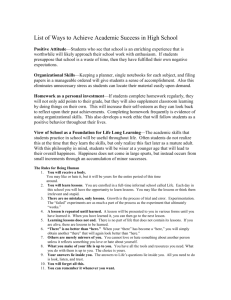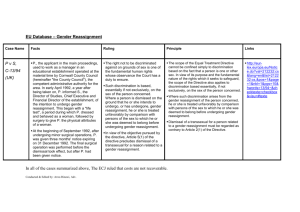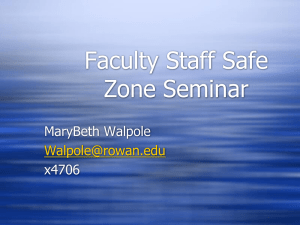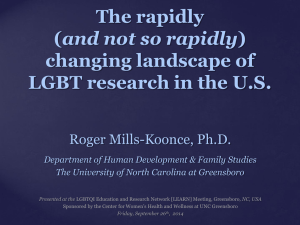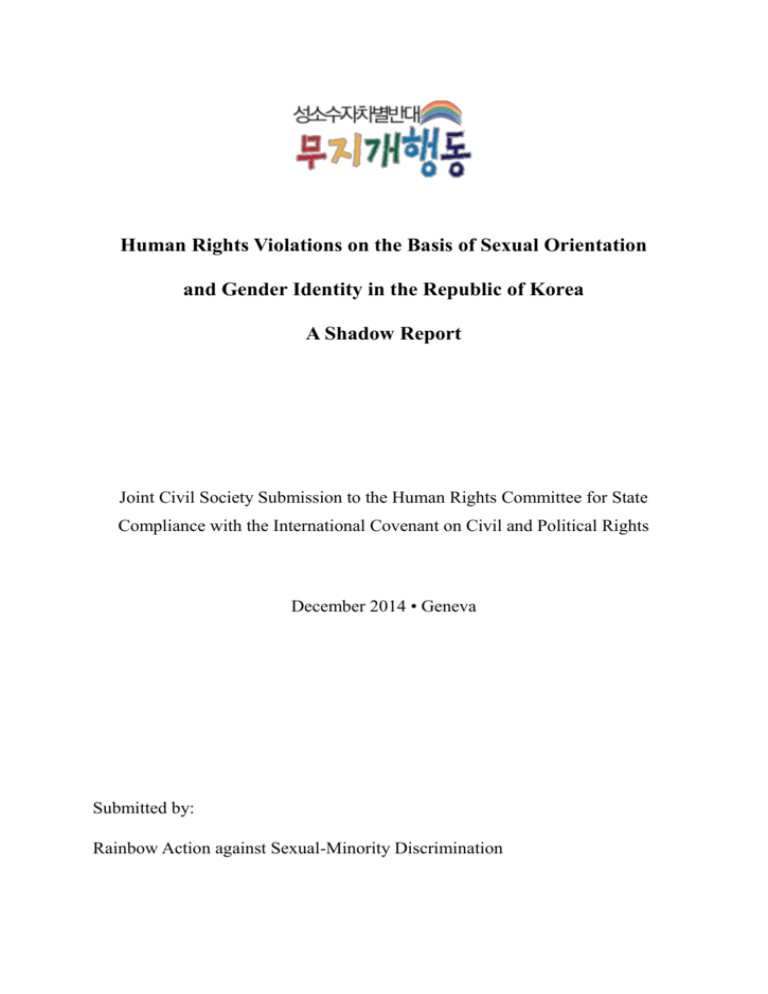
Human Rights Violations on the Basis of Sexual Orientation
and Gender Identity in the Republic of Korea
A Shadow Report
Joint Civil Society Submission to the Human Rights Committee for State
Compliance with the International Covenant on Civil and Political Rights
December 2014 • Geneva
Submitted by:
Rainbow Action against Sexual-Minority Discrimination
Table of Contents
Introduction ........................................................................................................................................................... 3
Substantive Violations of the Convention .................................................................................................... 4
1. Equality and Non-discrimination ........................................................................................................... 4
A.
Failure to Legislate the Anti-Discrimination Act - Art. 2(1) and 26 ................................... 4
B.
Article 92(6) of the Military Criminal Act, Which Punishes Consensual Same-sex
Acts - Art. 2(1) and 26 .................................................................................................................................... 5
C.
Discrimination against same-sex couples in areas of social security, health care -
Art.2(1), 23 and 26........................................................................................................................................... 6
2. Hate Crime against LGBT People – Art.2, 6 ,7 and 26 ................................................................... 8
3. Human Rights Violation Against Transgender People ................................................................ 10
4. Hate Speech and Discriminatory Practice in the Public Sphere................................................... 13
Art. 19 and 20(2)......................... 13
A.
Hate Speech and Incitement to Hate against LGBT -
B.
Violations of Right to Assembly and Lack of Protection by Authority – Art. 21 ............ 13
5. Discrimination against on people living with HIV/AIDS – Art. 2(1), 26 .................................... 15
2
Introduction
The present submission is prepared by Rainbow Action, a coalition of 20 LGBT NGOs in the
Republic of Korea for the consideration of the UN Human Rights Committee as an additional
source of information to the fifth periodic report of the Republic of Korea.
The Republic of Korea acceded to the International Covenant on Civil and Political Rights on
10 April 1990. Although the government has made many important steps in implementing the
Covenant, it has yet to fully succeed in protecting from discrimination on grounds of sexual
orientation and gender identity. The fourth periodic report submitted by the Government on 4
November 2013 does not discuss any measure to prohibit discrimination on grounds of sexual
orientation and gender identity. (CCPR/C/KOR/4)
This report is a collaborative effort by many activists from various organizations within the
Rainbow Action. Korean-to-English translation is done by Yusuk Kim, additionally Minhee
Ryu.
Rainbow Action against Sexual-Minority Discrimination
GongGam Human Rights Law Foundation, Sexual Politics Committee of the Labor Party,
Dong In Ryun : Solidarity for LGBT Human Rights of Korea, Daegu Queer Culture Festival,
Lezpa : Korean lesbian community radio group, Totally Queer: LGBTAIQ Crossing the
Damn World, Gruteogi : Lesbi an commuity group, Collective for Sexual Minority Cultures
PINKS, Unninetwork, Byunnal : sexual minority Human Rights Group of Ewha Womans
University, Sexual Minority Committee of the Justice Party, Network for Glocal Activism,
Chasegiyeon : Christian Solidarity for World without Discrimination, Korea Queer Culture
Festival, Chingusai : Korean Gay Men’s Human Rights Group, Lesbian Counseling Center in
South Korea, Korean Sexual-Minority Culture and Rights Center(KSCRC), Nanuri+ :
Solidarity for HIV/AIDS Human Rights, QUV : LGBTQ Student Alliance of Korea
3
Substantive Violations of the Convention
1. Equality and Non-discrimination
A. Failure to Legislate the Anti-Discrimination Act - Art. 2(1) and 26
Many human rights treaty bodies and other state parties during the Universal Peer Review
have urged the Republic of Korea to adopt expeditiously a comprehensive anti-discrimination
law that clearly spells out all the grounds for discrimination including sexual orientation.1
The Government has reported that, in relation to the Anti-Discrimination Act, it cited the
“[prospective] legislation of the Anti-Discrimination Act as a national agenda” (Feb. 2013)
through the Presidential Transition Committee and took many measures through the 4th
report (para. 378). However, to this date, it has never openly presented the progress of and
concrete legislative process for the Anti-Discrimination Act or held meetings with
organizations to which the grounds for the prohibition of discrimination are applicable. In
addition, a report conducted for the National Human Rights Commission of Korea (NHRCK)
demonstrates through the South Korean people’s responses the need to legislate the AntiDiscrimination Act: “Very necessary” (31.9%) and “Generally necessary” (27.9%). In
addition, according to Key Results of the South Korean LGBTI Community Social Needs
Assessment Survey, 53.2% of LGBTI people cite the legislation of the Anti-Discrimination
Act as the most important policy issue.
1
2009년 CESCR(E/C.12/KOR/CO/3, para 9), 2011년 CEDAW(CEDAW/C/KOR/CO/7, para15),
CRC(CRC/C/KOR/CO/3-4, para 29), 2012년 UPR(para 223, 24, 33)
4
Suggested Questions
•
What steps was made by the State party to enact the comprehensive antidiscrimination law that covers sexual orientation and gender identity since the
reporting of 4th cycle report, in terms of research, raising awareness, and
consultation with civil society, especially LGBT NGOs?
•
Does the State party have a concrete time frame for the plan for the legislation of
the Anti-Discrimination Act?
B. Article 92(6) of the Military Criminal Act, Which Punishes Consensual
Same-sex Acts - Art. 2(1) and 26
In the 2012 Universal Periodic Review (UPR), the Republic of Korea was recommended to
review again the possibility of abolishing Article 92(6) of the Military Criminal Act.
Nevertheless, it claims that “[This article] has the purpose of maintaining discipline within
the military by punishing specific acts of indecent conduct; it is not a regulation for the
punishment of sexual orientation itself.” However, the “indecent conduct” alluded to in this
legal clause signifies sexual contact between members of the same sex that is not coercive or
exhibitory. As such, the clause can even punish same-sex acts that do not result from coercion
such as assault or threats and are based on mutual consent.
In other words, even though
sexual violence not only between members of opposite sexes but also between members of
the same sex can be punished based on Articles 92-92(5) of the Military Criminal Act, Article
92(6) has been established separately and expressly to punish consensual same-sex acts.
Moreover, while sexual acts between members of opposite sexes in the military are regulated
with disciplinary measures, same-sex acts are regulated with penal servitude. This shows that
Article 92(6) is a discriminatory measure providing disparate treatment to sexual acts
between members of opposite sexes and between members of the same sex, thus
criminalizing homosexuality in fact.
5
Even if the number of cases to which it has been applied is small, the crime of “indecent
conduct” in the Military Criminal Act has existed as a regulation with practical regulatory
power and can be evaluated as having served as a legal ground for discrimination against
gender/sexual minorities. Consequently, an environment that is discriminatory and violates
human rights has been created for gender/sexual minorities in the military regardless of the
presence of sexual contact, thus increasing the likelihood of violating the human rights of
gender/sexual minorities who are fulfilling their duty to perform military service. In addition,
it is likely to spread in society the prejudice that homosexual orientation must be treated like
crime.
Suggested Questions
•
What are the grounds for regulating sexual acts between members of opposite
sexes in the military with disciplinary measures while regulating same-sex acts
with penal servitude?
•
How does Article 92(6) of the Military Criminal Act help the military in terms of
the unit cohesion and military discipline?
C. Discrimination against same-sex couples in areas of social security, health
care - Art.2(1), 23 and 26
Article 2(2) of The Act on the Prevention of Spousal Violence and the Protection of Victims
defines “the members of household” but the definition does not cover the relationships
beyond marital relationship and de facto. While the law is not explicitly confined to differentsex couples, law enforcement officials don’t apply the antiviolence provisions to non-married
same-sex couples. Also, many social security laws and policies like the National Health
Insurance Programs, Public Housing Act do not cover same-sex relationships.
6
Suggested Questions
•
What measure does the State party take to prevent discrimination against nonmarital same-sex couple and different treatment of same-sex couples in
comparison with non-marital heterosexual couples (de facto or common-law
marriage) in terms of social security and welfare?
D. Non-recognition of same-sex partnership or marriage - Art.2(1), 23 and 26
In 2014, a gay male couple submitted to an administrative agency a statement reporting their
marriage. However, they were given the answer that the current Civil Act did not allow samesex marriage and that their application for marriage registration therefore could not be
accepted. Also, there is no legislation to recognize the same-sex partnership in the Republic
of Korea.
Suggested Questions
•
What is the State party’s plan to recognize the same-sex union or same-sex
marriage?
7
2. Hate Crime against LGBT People – Art.2, 6 ,7 and 26
Transgender people are disadvantaged in employment and labor because they are easily
exposed to prejudice and discrimination, laws for legal sex reassignment have yet to be
legislated, and only the Guidelines on the Clerical Processing of Cases of Transsexuals’
Application for Legal Sex Reassignment, whose standards are inconsistent, are implemented.
Amidst such a situation, even though prostitution is illegal in South Korea, many transgender
people, especially MTF transgender people, earn their living through prostitution. Because
prostitution is thus illegal, transgender people who earn their livelihood in this way cannot
make reports to the police even when they suffer from injuries or damages. Incidents abusing
this vulnerability have occurred including: a transgender person was stabbed no fewer than
22 times and murdered in 2014; and another transgender person was robbed of money and
valuables after a mob attack in 2012.
In 2011, in an area in the Jongno-gu district of Seoul where many bars for gay men are found,
there occurred an incident in which a gay male couple was subjected one-sidedly to a mob
attack by three men yelling insults such as “Faggot bastards.”
In September 2013, for the first time in South Korea, an open wedding ceremony for the gay
male couple Kim Seung-hwan and Kimjho Gwang-soo was held. During the ceremony, a
man in his 50s identifying himself as a church elder stormed on the stage and hurled feces.
Subsequently, another man with a sign stating “Let’s smash gay marriage” attacked Kimjho
as well.
8
Suggested Questions
•
What measures does the government take to protect LGBT people from
violence?
•
Does the State party recognize violence based on sexual orientation and gender
identity as hate crime and possess statistics on hate crime?
•
How many cases of penalties for hate crimes against LGBT people have been
registered by the State over the few years?
•
What specific measures does the State party take in relation to law enforcement
officials and judges so that they had the possibility and could work with cases of
homophobic and transphobic hate crimes?
9
3. Human Rights Violation Against Transgender People
A. Legal Recognition of Transgender Persons’ Gender identity
•
Requirement for Forced Surgeries for Transsexuals’ Legal Sex Reassignment
- Art. 2(1), 7, 9 and 26
Drawn up in 2006, the South Korean Supreme Court’s Guidelines on the Clerical Processing
of Cases of Transsexuals’ Application for Legal Sex Reassignment are guidelines created for
reference when transsexuals apply for legal sex reassignment. Even though they do not
constitute a law with legal binding force, they possess de facto regulatory power in court.
When transsexuals submit legal sex reassignment application forms, these established
regulations demand: written diagnoses of transsexualism from two or more psychiatrists;
absence of reproductive ability; completion of sex reassignment surgeries; absence of
underage children; state of being unmarried; and written consent from parents (regardless of
applicants’ ages). Out of these, the surgery requirement forces unwanted surgical operations
on many transsexuals just for legal sex reassignment on personal identification documents.
•
Requirement Demanding the Absence of Underage Children and/or State of
Being Unmarried as a Condition for the Legal Sex Reassignment of
Transsexuals - Art. 2(1), 7, 9, 23 and 26
And the Guidelines has demanded the absence of underage children as a condition for legal
sex reassignment. Consequently, transsexuals with underage children have suffered from
difficulty in actively exercising their parental rights and protecting their children due to
appearances that differ from the sexes on their personal identification documents. In addition,
10
these guidelines demand the state of being unmarried as a condition for legal sex
reassignment, thus forcing divorce on married applicants for legal sex reassignment.
B. Determination of Potential Conscripts’ Military Fitness Grades That Forces
Body Mutilation Including Orchiectomy on Male-to-female Transgender People
– Art. 2(1), 7, 9 and 26
The physical examination standards of the Military Manpower Administration (MMA)
classify the degree of gender identity disorder (GID; gender dysphoria) into
light/medium/severe without reference to physical invasion.
However, the practice of
determining the standards of light/medium/severe GID depends on military physicians’
arbitrary judgment. Although written psychiatric diagnoses alone are sufficient, some
physicians suggest/demand irreversible surgeries including orchiectomy (testicle removal) for
the reason that there may be suspicions of evasion of mandatory military service. Many MTF
transgender people forced to have orchiectomy or gender reassignment surgeries at times not
of their choice due to state pressure.
11
Suggested Questions
•
Does the State party have plans to establish legal procedures that do not
presuppose sterilization operations or irreversible medical interventions when
transsexuals apply for legal sex reassignment?
•
Does the State party have plans to establish legal procedures that do not demand
the absence of underage children and/or the state of being unmarried.?
•
What are the MMA’s current standards for transgender people’s exemption from
military service based on light/medium/severe GID and reasons for demanding
irreversible surgeries? What efforts is the MMA making to establish standards for
determining potential conscripts’ military fitness grades that do not violate
individuals’ body modification?
12
4. Hate Speech and Discriminatory Practice in the Public Sphere
A. Hate Speech and Incitement to Hate against LGBT - Art. 19 and 20(2)
Unchecked, hate speech is proliferating in South Korean society. Consequently, spaces in
which figures including politicians and religious leaders express their view of homophobia
and transphobia as threats, and hostility against LGBT people are increasing on the Internet
and in public organs. In particular, in the process of legislating or attempting to legislate the
Anti-Discrimination Act, Seoul Student Rights Ordinance, and Seoul Charter of Human
Rights, hate against social minorities has become even more noticeable. However, the
Government and many municipal governments not only are unaware of its gravity and have
failed to respond properly but also lack long-term plans.
Amidst such a situation, the President even appointed, as the Minister of Education, one of
the joint representatives of an organization that has carried on the movement to delete from
textbooks the prohibition of discrimination against homosexuality on the grounds that
“Textbooks promote immoral homosexuality” and, as a commissioner of the NHRCK, a
figure who has opposed the legislation of the Anti-Discrimination Act.
B. Violations of Right to Assembly and Lack of Protection by Authority – Art.
21
In June 2014, an annual LGBT pride parade held in Seoul was came to a standstill for some
four hours due to interference by homophobic organizations. Although the organizers had
reported the festival and the parade in advance, Seodaemun Police Station neither guaranteed
13
the attendant rights nor made efforts to check the homophobic organizations that threatened
and inflicted violence on participants in the festival and parade.
Suggested Questions
•
What measures does the State party to protect LGBT people from hate speech and
dissemination of prejudices?
•
What’s the legal framework of the State party to regulate hate speech and
incitement to hate including campaigns and the establishment of legal
apparatuses?
•
What measure does the State party take to prevent social environments that reduce
the freedom of expression and the right to assembly and acts of hate based on
discriminatory perceptions?
14
5. Discrimination against on people living with HIV/AIDS – Art. 2(1), 26
In processing information on people living with HIV/AIDS (PLWHA) in accordance with
Prevention of Acquired Immune Deficiency Syndrome Act and the HIV/AIDS Management
Guidelines, the South Korean government places no restrictions on the use of the people’s
real names. Consequently, there occasionally are cases where information on the real names
of PLWHA is leaked. As such, the claim of the government’s report that regulations on
anonymous medical examinations have been newly established to encourage medical
examinations on potential PLWHA and to minimize the leakage of personal information is
false. The truth is that anonymous medical examinations have not become active and that
even when medical examinations are anonymous, if and when a person is diagnosed to be
HIV-positive, his or her real name is reported. There are regulations stating that, in the case of
anonymous tests, information on PLWHA must be managed anonymously. However, the
reporting of real names is induced through connection with support for medical examination
fees.
Moreover, HIV tests conducted without notification and without testees’ consent (forced HIV
tests) are expanding. Human rights violations in themselves, such forced tests also expose
information on illnesses and therefore do not adhere to medical ethics. Forced HIV tests are
conducted on foreigners, prisoners, and soldiers (military service is mandatory in South
Korea), and cases in which hospitals conduct HIV tests, without prior explanations of and
prior acquisition of consent to tests, on patients who wish to receive operations are increasing.
15
Suggested Questions
•
What’s the State party’s plan to prohibit the real-name reporting and management
of PLWHA?
•
The State party must concretely elucidate the reality of forced tests conducted on
foreigners, soldiers, and prisoners and state whether or not it has plans to abolish
forced tests.
•
The State party must explain whether or not it has plans to make mandatory prior
explanations and testees’ consent when people are subjected to HIV tests during
hospital tests conducted before operations or aimed at discovering the causes of
diseases.
16



